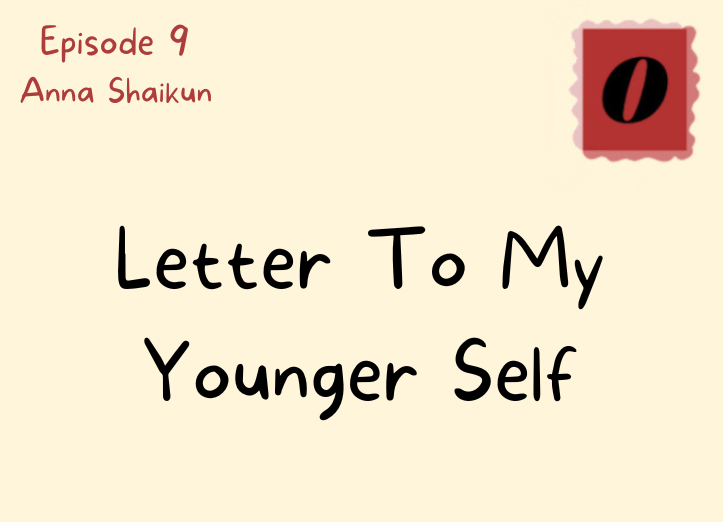ODYSSEY Media Group Digital Editor-in-Chief Anna Shaikun’s edition of the Letter To My Younger Self visual is shown. Shaikun has played the tabletop roleplaying game Dungeons and Dragons since she was in middle school, and it has helped her expand her social horizons. “Even though you’re always acting as someone else, playing D&D with people you trust makes you feel like you truly belong somewhere in the real world,” Shaikun said. “You’ll learn that while fantasy escapism is fine in moderation, you can’t live entirely in your own head – there are real human beings who deserve your attention.” Graphic by Anna Shaikun
Digital Editor-in-Chief Anna Shaikun details her social growth with the help of the tabletop roleplaying game Dungeons and Dragons.
Hi, I’m Anna Shaikun. I’m a senior and the Digital Editor-in-Chief for the ODYSSEY Media Group at Clarke Central High School. This is my “Letter to my Younger Self.” In this podcast, students share a letter they’d like to give to their past selves full of advice, warnings, encouragement and insight into what their future holds. This is my Letter to My Younger Self.
Dear 11-year-old Anna,
You’re probably sitting in math class right now, or maybe eating lunch at school. Regardless, I know exactly what you’re actually doing: sitting alone with your nose in a book. You don’t see the point of interacting with other human beings when you could be reading about Percy Jackson discovering Camp Half-Blood, or Harry Potter facing down Voldemort.
I know you dream about being transported away to one of the magical realms you read about, somewhere where you could be a beloved side character instead of just some kid sitting on the side of the soccer field. But while you will always retain your love for fantasy and storytelling, you will also find a reason to keep your focus here, in your world.
When you’re in seventh grade, your brother Shepherd’s best friend Alex will receive a Christmas present from his parents – a box full of giant rulebooks for a game called Dungeons and Dragons, or D&D. It’s an open-world tabletop roleplaying game, meaning you get to control a fantasy character that you create, engaging in roleplay and combat through improvisational acting, in a world where you can do anything you want.
Soon, you play your first game of D&D with Shep and Alex. Your character slays some monsters, befriends a wolf, and begins to investigate a mystery in the fictional region of Phandelver. The world feels boundless, and you are ecstatic to assume the role of a hero like the ones you’ve always admired.
Although you enjoy that first campaign with the boys for a while, you end up craving more. You start listening to D&D podcasts like “Dimension 20,” and you’re enthralled by the complex relationships between player characters – something that’s a little difficult for your pre-teen compatriots to embody. After a little hesitation, you gather a group of same-age friends, tempt them with shiny dice, and play.
You start your own campaign as the Dungeon Master – the person who controls the world and characters that the players interact with. Surprisingly, being Dungeon Master isn’t that different from simply writing a story – you draw on years of reading your heart out as inspiration for creating worlds, and use your imagination to benefit other people. And even though some of your friends are a little hesitant at first, they end up loving every session – a few even ask to have D&D sessions in place of their birthday parties.
Through your campaign, you actually get to know your “adventuring party” a little better. You figure out how to make your quiet friends engage in both roleplay and conversation, see what pieces of themselves they put into their characters, and laugh until you cry as they bring their silly jokes to fruition. Every session reminds you of how much you love these people.
D&D doesn’t just affect your relationships with old friends. Your senior year, a boy in your class invites you to a campaign with a few of his friends. You’re scared to death at first – you hardly know these guys – but you take that risk, and it pays off. While they’re definitely different from your middle school buddies, you find a group of kind, intelligent people who get all your stupid jokes. Your Tuesday sessions become the highlight of your week.
Even though you’re always acting as someone else, playing D&D with people you trust makes you feel like you truly belong somewhere in the real world. You’ll learn that while fantasy escapism is fun in moderation, you can’t live entirely in your own head – there are real human beings who deserve your attention.
Dungeons and Dragons is so much more than a game to you. You’ve found a passion, a creative outlet, and friends that care about you whether or not you’re pretending to be an elf. I know that community seems more distant than the fantasy lands inside the books you read, but you’ll get there sooner than you think. Just remember: an adventurer is nothing without their party.
Fare thee well, little hero,
Future Anna
